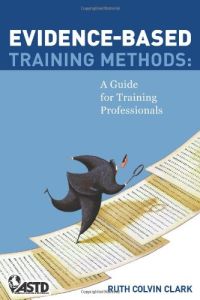Join getAbstract to access the summary!

Join getAbstract to access the summary!
Ruth Colvin Clark
Evidence-Based Training Methods
A Guide for Training Professionals
ASTD Publications, 2010
What's inside?
Programs that most corporate trainers believe educate students probably don’t work.
Recommendation
Many professionals suffer misconceptions about which training methods work and which do not. Instructional design expert Ruth Colvin Clark explodes the myths regarding training. To replace the practices she discredits, Clark gives instructors numerous research-based recommendations. Learning professionals turn to Clark for their own development, an accolade from her peers that encourages getAbstract to recommend her heavily researched insights to teachers, training materials developers, e-learning professionals and training managers.
Summary
About the Author
Ruth Colvin Clark founded her own company, Clark Training & Consulting, and is a former president of the International Society for Performance Improvement.

















Comment on this summary